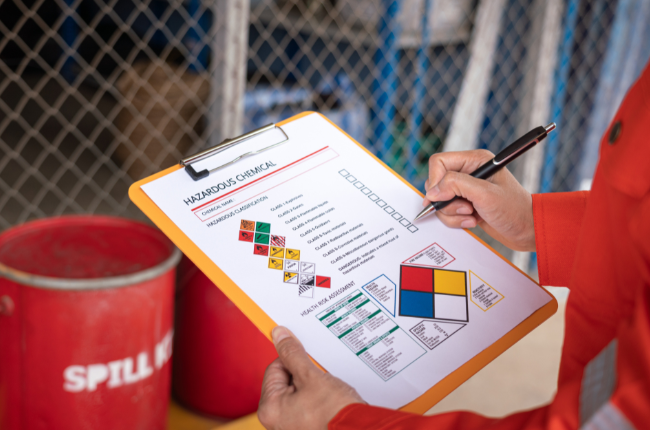Bulk chemicals and underground petroleum storage systems (UPSS) are vital to a council’s daily operations. But they do come with risks.
Whether stored at council depots or emergency response facilities, these volatile materials require careful handling to protect your staff and community.
Read on to learn practical steps your council can take to strengthen procedures and ensure safety.
A proactive approach to chemical safety
When it comes to potentially dangerous chemicals, minimising hazards and avoiding accidents through adequate storage and handling procedures should be your top priority. And it requires a proactive approach.
Begin by reviewing your current controls through a risk assessment for dangerous goods, particularly Class 3 and Class 5 goods, flammable liquids and oxidising substances. This will help you identify critical gaps in your procedures.
Next, ensure you’ve stored chemicals safely and established clear handling procedures, including a plan for responding to a spill. Also, provide comprehensive chemical handling and spill response training to equip your team with the knowledge they need – an essential step.
After all, well-prepared staff are your first line of defence against a potentially fatal incident.
Compliance that safeguards the environment
Complying with bulk chemicals and fuel storage guidelines isn’t just about following the rules – it’s about safeguarding your workforce and community, too.
So, it’s essential to ensure your chemical storage practices meet Australian Standards (AS 1940:2017) to reduce the risk of leaks or spills into local ecosystems. And if your UPSS facilities were installed before 2008, check that they’re operated in accordance with AS 4897:2008.
This is where a robust Environmental Protection Plan (EPP) comes in. An EPP will provide a detailed look at storage requirements, handling procedures, ecological safeguards and more.
Whether you’re developing one from scratch or reviewing an existing plan, an EPP will help you comply with regulations and prevent spills.
It’s one of the most effective ways councils can maintain a safe operation while protecting precious natural resources.
Inspect, record and engage
Regular inspections are a key part of safe storage and handling practices. Conducting and recording these inspections as per Australian Standards ensures your facilities meet safety requirements.
Plus, keeping a detailed record protects your council and provides a clear picture of risks and potential improvements.
Consider bringing in an accredited third party to perform a gap analysis of your facilities for a fresh perspective. This independent reviewer can identify areas for improvement – and help strengthen your compliance efforts.
It’s a foolproof way to ensure nothing slips through the cracks.
Support is available
Managing bulk chemicals and fuels comes with many responsibilities, but you don’t have to do it alone. A range of resources, guides and training materials are available to help your council stay compliant and manage risks effectively.
To access materials on safer practices, information on training or the most up-to-date environmental protection tools, you can visit:
And remember: small steps can make a big difference in protecting your community and the environment. So even if you’re only ready to take one small step, there’s never been a better time to start than right now.
Need a hand reviewing your bulk chemical storage practices? Your Statewide Mutual Regional Risk Manager is just a phone call away.

